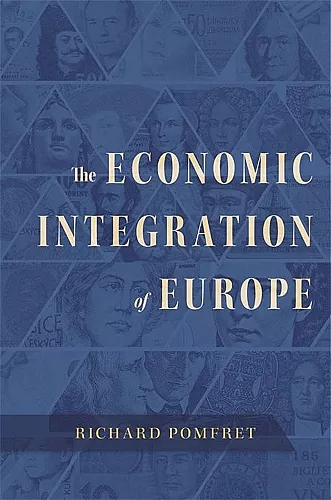The Economic Integration of Europe
Format:Hardback
Publisher:Harvard University Press
Published:25th Jun '21
Should be back in stock very soon

The clearest and most up-to-date account of the achievements—and setbacks—of the European Union since 1945.
Europe has been transformed since the Second World War. No longer a checkerboard of entirely sovereign states, the continent has become the largest single-market area in the world, with most of its members ceding certain economic and political powers to the central government of the European Union. This shift is the product of world-historical change, but the process is not well understood. The changes came in fits and starts. There was no single blueprint for reform; rather, the EU is the result of endless political turmoil and dazzling bureaucratic gymnastics. As Brexit demonstrates, there are occasional steps backward, too. Cutting through the complexity, Richard Pomfret presents a uniquely clear and comprehensive analysis of an incredible achievement in economic cooperation.
The Economic Integration of Europe follows all the major steps in the creation of the single market since the postwar establishment of the European Coal and Steel Community. Pomfret identifies four stages of development: the creation of a customs union, the deepening of economic union with the Single Market, the years of monetary union and eastward expansion, and, finally, problems of consolidation. Throughout, he details the economic benefits, costs, and controversies associated with each step in the evolution of the EU. What lies ahead? Pomfret concludes that, for all its problems, Europe has grown more prosperous from integration and is likely to increase its power on the global stage.
A fast-moving narrative of Europe’s post-war successes, challenges and, yes, failures too, as the continent’s leaders sought to rebuild, redesign and to embed cooperation at the very heart of the EU enterprise. -- Stuart P. M. Mackintosh * Financial World *
This book is both important and timely…It is an incredibly concise and well-written history of the origins and growth of the EU. The mix of history, politics, and economics is fascinating…A thoroughly enjoyable and worthwhile read. -- Robert Breunig * Economic Record *
Written by one of the world’s experts on the subject, this book accomplishes the amazing feat of succinctly reviewing and analyzing all dimensions of the complicated process of European economic integration from its origins through the COVID-19 pandemic. It is arranged to inform professional economists and non-economists alike; it is a superb text for students at all levels and an excellent reference for scholars interested in the economics of European integration. -- Michael G. Plummer, Director of SAIS Europe, Johns Hopkins University School of Advanced International Studies
Written by a well-known economist and specialist in forms of market integration on several continents, this accessible book is an ideal non-technical guide to European economic integration for political scientists, lawyers, and students of international business and contemporary history. It is also suitable as a foundation for an introductory course for undergraduate economic students. Richard Pomfret combines a pleasant style of writing with an ambitious step-by-step account of the deepening and widening of European economic integration over six decades, with lots of telling examples illustrating the building blocks of the analysis. Highly recommended. -- Jacques Pelkmans, Senior Fellow at CEPS, Brussels, and Visiting Professor at the College of Europe, Bruges, and Goethe University, Frankfurt
The way countries integrate among themselves has changed enormously in the past two decades and this is evident, more than anywhere else, in the European Union. In The Economic Integration of Europe, Richard Pomfret offers an original, concise, and timely assessment of this process so far. It is required reading for scholars and policymakers who want to understand the unique institutional history of this integration project. -- Nauro F. Campos, University College London
Richard Pomfret brings together history and economic analysis to enable the reader to take an informed view of how European integration is likely to evolve in the years ahead. It is an indispensable source for general readers and specialists alike. -- Michael Leigh, Adjunct Professor, Johns Hopkins University, SAIS Europe, Fellow, Bruegel
ISBN: 9780674244139
Dimensions: unknown
Weight: unknown
272 pages